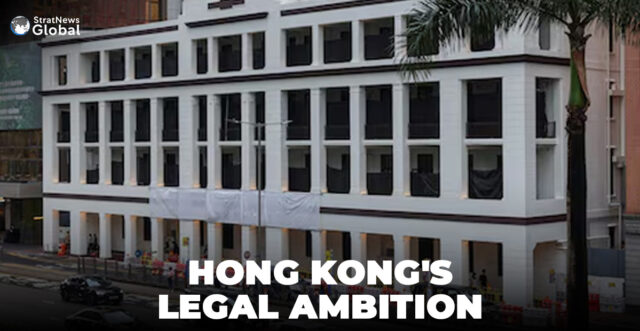China on Friday signed a convention to establish an international mediation body in Hong Kong, aiming to elevate it to the level of the International Court of Justice and enhance the city’s global standing.
The move comes amid growing geopolitical tensions that have been exacerbated by U.S. President Donald Trump’s global trade war and fuelled risks of a sharp worldwide economic downturn.
HK Eyes Legal Prominence
The mediation body aims to cement Hong Kong’s presence as a top centre to resolve disputes between countries, leader John Lee said earlier this week, adding that its status would be on par with the International Court of Justice and the Permanent Court of Arbitration of the United Nations in The Hague.
Indonesia, Pakistan, Laos, Cambodia and Serbia were among the countries attending the signing ceremony. Representatives from 20 international bodies, including the United Nations, were also expected to join, public broadcaster RTHK said.
A video shown at the signing, which was presided by Chinese Foreign Minister Wang Yi, said the scope of cases that would be handled include disputes between countries, between a country and nationals of another country and between private international entities.
The mediation group could advance China’s influence internationally and promote a more assertive role for the world’s second-largest economy in global governance, some analysts said, although its success remains to be seen.
‘Good News For HK’
Alicia Garcia-Herreo, chief Asia Pacific economist at Natixis, said the move was good news for Hong Kong, however, she cited arbitration centres in Chinese cities Xian and Shenzhen, which had not worked well.
“Hong Kong has been offered as an alternative, but I still think that borrowers, especially borrowers or anybody with a Belt and Road contract (BRI) related or with a Chinese leg, will feel less protected nowadays,” she said.
Hong Kong tied with Singapore for second place, behind London, as the top choice for a seat of arbitration in 2025, according to the 2025 International Arbitration Survey conducted by Queen Mary University of London.
Hong Kong’s Justice Secretary Paul Lam said that the new body would help Hong Kong cope with challenges that arise when “hostile external forces are attempting to de-internationalise and de-functionalise” the city.
Headquartered In Wan Chai
The new organisation’s headquarters will be located at a former police station in the bustling Wan Chai district, and is due to open by the end of this year or early 2026.
Authorities in Hong Kong have been struggling to revive the financial centre after sometimes violent protests in 2019, and COVID lockdowns hammered the tourism and retail industries.
(With inputs from Reuters)





